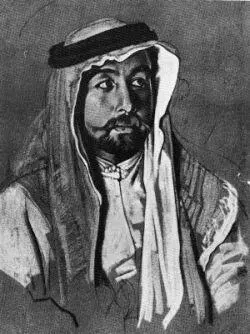 Emir Abdulla
Emir Abdulla
To Ali himself I took a great fancy. He was of middle height, thin, and looking already more than his thirty-seven years. He stooped a little. His skin was sallow, his eyes large and deep and brown, his nose thin and rather hooked, his mouth sad and drooping. He had a spare black beard and very delicate hands. His manner was dignified and admirable, but direct; and he struck me as a pleasant gentleman, conscientious, without great force of character, nervous, and rather tired. His physical weakness (he was consumptive) made him subject to quick fits of shaking passion, preceded and followed by long moods of infirm obstinacy. He was bookish, learned in law and religion, and pious almost to fanaticism. He was too conscious of his high heritage to be ambitious; and his nature was too clean to see or suspect interested motives in those about him. Consequently he was much the prey of any constant companion, and too sensitive to advice for a great leader, though his purity of intention and conduct gained him the love of those who came into direct contact with him. If Feisal should turn out to be no prophet, the revolt would make shift well enough with Ali for its head. I thought him more definitely Arab than Abdulla, or than Zeid, his young half-brother, who was helping him at Rabegh, and came down with Ali and Nuri and Aziz to the palm-groves to see me start. Zeid was a shy, white, beardless lad of perhaps nineteen, calm and flippant, no zealot for the revolt. Indeed, his mother was Turkish; and he had been brought up in the harem, so that he could hardly feel great sympathy with an Arab revival; but he did his best this day to be pleasant, and surpassed AM, perhaps because his feelings were not much outraged at the departure of a Christian into the Holy Province under the auspices of the Emir of Mecca. Zeid, of course, was even less than Abdulla the born leader of my quest. Yet I liked him, and could see that he would be a decided man when he had found himself.
Ali would not let me start till after sunset, lest any of his followers see me leave the camp. He kept my journey a secret even from his slaves, and gave me an Arab cloak and head-cloth to wrap round myself and my uniform, that I might present a proper silhouette in the dark upon my camel. I had no food with me; so he instructed Tafas to get something to eat at Bir el Sheikh, the first settlement, some sixty miles out, and charged him most stringently to keep me from questioning and curiosity on the way, and to avoid all camps and encounters. The Masruh Harb, who inhabited Rabegh and district, paid only lip-service to the Sherif. Their real allegiance was to Hussein Mabeirig, the ambitious sheikh of the clan, who was jealous of the Emir of Mecca and had fallen out with him. He was now a fugitive, living in the hills to the East, and was known to be in touch with the Turks. His people were not notably pro-Turkish, but owed him obedience. If he had heard of my departure he might well have ordered a band of them to stop me on my way through his district.
Tafas was a Hazimi, of the Beni Salem branch of Harb, and so not on good terms with the Masruh. This inclined him towards me; and when he had once accepted the charge of escorting me to Feisal, we could trust him. The fidelity of road-companions was most dear to Arab tribesmen. The guide had to answer to a sentimental public with his life for that of his fellow. One Harbi, who promised to take Huber to Medina and broke his word and killed him on the road near Rabegh, when he found out that he was a Christian, was ostracized by public opinion, and, in spite of the religious prejudices in his favour, had ever since lived miserably alone in the hills, cut off from friendly intercourse, and refused permission to marry any daughter of the tribe. So we could depend upon the good will of Tafas and his son, Abdulla; and Ali endeavoured by detailed instructions to ensure that their performance should be as good as their intention.
We marched through the palm-groves which lay like a girdle about the scattered houses of Rabegh village, and then out under the stars along the Tehama, the sandy and featureless strip of desert bordering the western coast of Arabia between sea-beach and littoral hills, for hundreds of monotonous miles. In day-time this low plain was insufferably hot, and its waterless character made it a forbidding road; yet it was inevitable, since the more fruitful hills were too rugged to afford passage north and south for loaded animals.
The cool of the night was pleasant after the day of checks and discussions which had so dragged at Rabegh. Tafas led on without speaking, and the camels went silently over the soft flat sand. My thoughts as we went were how this was the pilgrim road, down which, for uncounted generations, the people of the north had come to visit the Holy City, bearing with them gifts of faith for the shrine; and it seemed that the Arab revolt might be in a sense a return pilgrimage, to take back to the north, to Syria, an ideal for an ideal, a belief in liberty for their past belief in a revelation.
We endured for some hours, without variety except at times when the camels plunged and strained a little and the saddles creaked: indications that the soft plain had merged into beds of drift-sand, dotted with tiny scrub, and therefore uneven going, since the plants collected little mounds about their roots, and the eddies of the sea-winds scooped hollows in the intervening spaces. Camels appeared not sure-footed in the dark, and the starlit sand carried little shadow, so that hummocks and holes were difficult to see. Before midnight we halted, and I rolled myself tighter in my cloak, and chose A. hollow of my own size and shape, and slept well in it till nearly dawn.
As soon as he felt the air growing chill with the coming change, Tafas got up, and two minutes later we were swinging forward again. An hour after it grew bright, as we climbed a low neck of lava drowned nearly to the top with blown sand. This joined a small flow near the shore to the main Hejaz lava-field, whose western edge ran up upon our right hand, and caused the coast road to lie where it did. The neck was stony, but brief: on each side the blue lava humped itself into low shoulders, from which, so Tafas said, it was possible to see ships sailing on the sea. Pilgrims had built cairns here by the road. Sometimes they were individual piles, of just three stones set up one above the other: sometimes they were common heaps, to which any disposed passer-by might add his stone--not reasonably nor with known motive, but because others did, and perhaps they knew.
Beyond the ridge the path descended into a broad open place, the Masturah, or plain by which Wadi Fura flowed into the sea. Seaming its surface with innumerable interwoven channels of loose stone, a few inches deep, were the beds of the flood water, on those rare occasions when there was rain in the Tareif and the courses raged like rivers to the sea. The delta here was about six miles wide. Down some part of it water flowed for an hour or two, or even for a day or two, every so many years. Underground there was plenty of moisture, protected by the overlying sand from the sun-heat; and thorn trees and loose scrub profited by it and flourished. Some of the trunks were a foot through: their height might be twenty feet. The trees and bushes stood somewhat apart, in clusters, their lower branches cropped by the hungry camels. So they looked cared for, and had a premeditated air, which felt strange in the wilderness, more especially as the Tehama hitherto had been a sober bareness.
Two hours up-stream, so Tafas told me, was the throat where Wadi Fura issued from the last granite hills, and there had been built a little village, Khoreiba, of running water channels and wells and palm-groves, inhabited by a small population of freedmen engaged in date husbandry. This was important. We had not understood that the bed of Wadi Fura served as a direct road from near Medina to the neighbourhood of Rabegh. It lay so far south and east of Feisal's supposed position in the hills that he could hardly be said to cover it. Also Abdulla had not warned us of the existence of Khoreiba, though it materially affected the Rabegh question, by affording the enemy a possible watering-place, safe from our interference, and from the guns of our warships. At Khoreiba the Turks could concentrate a large force to attack our proposed brigade in Rabegh.
Читать дальше

 Emir Abdulla
Emir Abdulla










